Heidegger in the Islamicate World
New Heidegger Research
Series Editors:
Gregory Fried, Professor of Philosophy, Suffolk University, USA;
Richard Polt, Professor of Philosophy, Xavier University, USA
The New Heidegger Research series promotes informed and critical dialogue that breaks new philosophical ground by taking into account the full range of Heideggers thought, as well as the enduring questions raised by his work.
Titles in the Series
After Heidegger?
Edited by Gregory Fried and Richard Polt
Correspondence 19491975
Martin Heidegger and Ernst Jnger, translated by Timothy Quinn
Existential Medicine
Edited by Kevin Aho
Heidegger and Jewish Thought
Edited by Micha Brumlik and Elad Lapidot
Heidegger and the Environment
Casey Rentmeester
Heidegger and the Global Age
Edited by Antonio Cerella and Louiza Odysseos
Heidegger Becoming Phenomenological: Preferring Dilthey to Husserl , 19161925
Robert C. Schaff
Heidegger in Russia and Eastern Europe
Edited by Jeff Love
Heideggers Gods: An Ecofeminist Perspective
Susanne Claxton
Making Sense of Heidegger
Thomas Sheehan
Proto-Phenomenology and the Nature of Language
Lawrence J. Hatab
Heidegger in the Islamicate World
Edited by Kata Moser, Urs Gsken, and Josh Hayes
Heidegger in the Islamicate World
Edited by
Kata Moser, Urs Gsken,
and Josh Hayes

London New York
Published by Rowman & Littlefield International Ltd.
6 Tinworth Street, London SE11 5AL, United Kingdom
www.rowmaninternational.com
Rowman & Littlefield International Ltd. is an affiliate of Rowman & Littlefield
4501 Forbes Boulevard, Suite 200, Lanham, Maryland 20706, USA
With additional offices in Boulder, New York, Toronto (Canada), and Plymouth (UK)
www.rowman.com
Copyright 2019 by Kata Moser, Urs Gsken, and Josh Hayes
Copyright in individual chapters is held by the respective chapter authors.
All rights reserved . No part of this book may be reproduced in any form or by any electronic or mechanical means, including information storage and retrieval systems, without written permission from the publisher, except by a reviewer who may quote passages in a review.
British Library Cataloguing in Publication Data
A catalogue record for this book is available from the British Library
ISBN: HB 978-1-78660-620-4
Library of Congress Cataloging-in-Publication Data Available
ISBN: 978-1-78660-620-4 (cloth: alk. paper)
ISBN: 978-1-78660-621-1 (electronic)
 The paper used in this publication meets the minimum requirements of American National Standard for Information SciencesPermanence of Paper for Printed Library Materials, ANSI/NISO Z39.48-1992.
The paper used in this publication meets the minimum requirements of American National Standard for Information SciencesPermanence of Paper for Printed Library Materials, ANSI/NISO Z39.48-1992.
Printed in the United States of America
Contents
Fred Dallmayr
Urs Gsken, Josh Hayes, and Kata Moser
Zeynep Direk
Amir Nasri
Nader El-Bizri
Sylvain Camilleri
Sevin Yasargil
Monir Birouk
Mansooreh Khalilizand
Saliha Shah
Ahmad Ali Heydari
Khalid El Aref
Ismail El Mossadeq
Seyed Majid Kamali
Syed Mustafa Ali
Urs Gsken, Kata Moser, and Erdal Yldz
I greatly appreciate the invitation to write a preface to the present volume, Heidegger in the Islamicate World . I had been genuinely excited last year when I learned that Rowman & Littlefield International (where I had published several of my books) was ready to launch a new book series titled New Heidegger Research. This seemed to me then (and still does) to be a very timely and innovative decision. Having been involved in Heidegger studies for many years, I had felt for some time that these studies had become largely sterile or repetitive (quite in contrast to the spirit of Heideggers work). Mainly two derailments, in my view, have been responsible for this state of affairs: on the one side, his entombment in a museum or mausoleum; on the other side, his relentless vilification (mainly for political reasons) aiming ultimately at his erasure. In the first case, his work was reduced to the academic rehearsal of particular Heideggerian formulas or terms of phrase; in the second case, it was merely the target of partisan use and abuse. What was lacking, in either case, was a serious engagement with the questioning or zetetic quality of Heideggers work, a work that was not finished but always en route or underway.
The new series launched by Rowman & Littlefield International gave me the hope that the spirit of this work would be unleashed again for the exploration of new developments and experiences. After all, having defined human being as being-in-the-world, Heideggers texts cannot be shielded from involvement in the ongoing happenings in our worldsuch as globalization, global-local dilemmas, and intercultural encounters. It is precisely when his texts are put to work in finite worldly contexts (which do not deny the infinite) that philosophy regains again that sense of excitementthe sense of wonderingthat Heidegger always sought to foster.
To be sure, when inserting his work into new contextsespecially non-Western contextsgreat caution is imperative. Differences in culture, religion, and social customs have to be seriously pondered to avoid the temptation of a rootless universalism or globalism. And there is the immense problem of translation. Heidegger was mainly a Western thinker, writing in Germanalthough his thinking (like all philosophizing) has an infinite horizon of truth. Certainly, his work cannot be exported to the non-West like a machine or package of goods. Above all, Heidegger must not be reduced to an agent of Eurocentrism or orientalism; there is no missionary or appropriating gesture in his work. In the spirit of letting be, Heidegger offers to others not formulas or solutions but food for thought and mindfulness ( Besinnung ). Such food for thought requires careful meditation and interrogation, militating against quick absorption or assimilation.
For people in non-Western contexts, Heideggers work presents special challenges. In my view, there are especially two dangers or temptations: to read his work either as purely restorative or else as purely deconstructive or revolutionary. In the first option, Heidegger is seen as the guardian of venerable cultural traditions, a guardian blocking the onrush of modernity, democracy, and globalization; in the second option, he is perceived as the smasher of the past and the herald of the Nietzschean overman. Both alternatives notice something correctly, but both miss the overall picture. Heidegger did indeed value the past and cultural tradition, not as something to be regurgitated and pontificated about, but as a resource needing constant reinterpretation and renewal so that it can illuminate the present and the future. One of his famous statements is that he tried to awaken the unthought in past thought. (Mohammed Arkoun used this formula in one of his books.) Another famous saying is Herkunft bleibt stets Zukunft (the past always lies in wait for the future). Thus, it is not possible to treat Heidegger simply as a conservative or reactionary. On the other hand, he is not an uncritical supporter of Western modernity (his critique of modern technology and technocracy is well known).
The present volume is called Heidegger in the Islamicate World . This is a very propitious undertaking. I see no reason why Heidegger and Islam should be viewed as antithetical or incompatible. In his Being and Time , Heidegger describes Being as transcendence as such. On the other hand, Islam has the notion of tawd , which points to something trans-worldly. Both notions, of course, are in need of careful interpretation. In this respect, I have one worry. I dont think that Heidegger can be reconciled with any tradition that banishes ongoing interpretation. Thus, any tradition that claims that the doors of ijtihd are closed necessarily leaves Heidegger outside. In his Being and Time , his philosophical approach is called a hermeneutical phenomenology; thus, hermeneutics is quite central. I recall here the unfortunate experience of my friend Nasr Hamid Abu Zayd, who was expelled from his position and his native country because he dared to interpret scriptural texts. I hope that this danger is slowly receding. I trust that young Muslims will find that religious faith has ultimately to be a matter of personal experienceand thus cannot be left to clerical authorities. I am glad to say that in the religious tradition to which I belong, the statement ecclesia semper reformanda has received even a papal blessing.

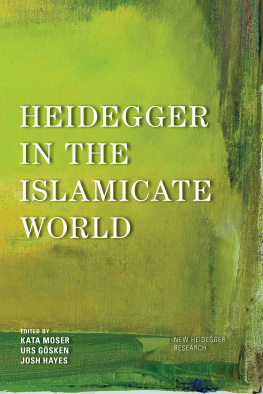
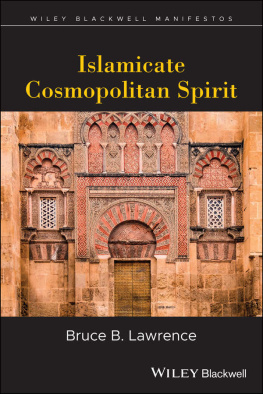
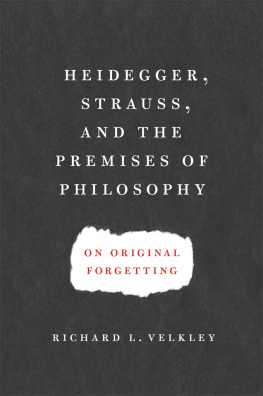
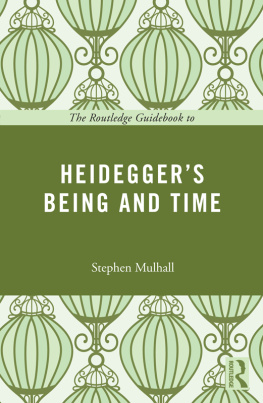
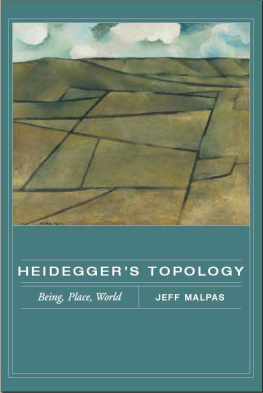

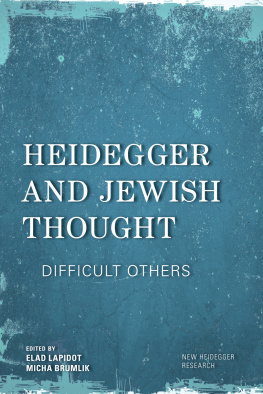






 The paper used in this publication meets the minimum requirements of American National Standard for Information SciencesPermanence of Paper for Printed Library Materials, ANSI/NISO Z39.48-1992.
The paper used in this publication meets the minimum requirements of American National Standard for Information SciencesPermanence of Paper for Printed Library Materials, ANSI/NISO Z39.48-1992.